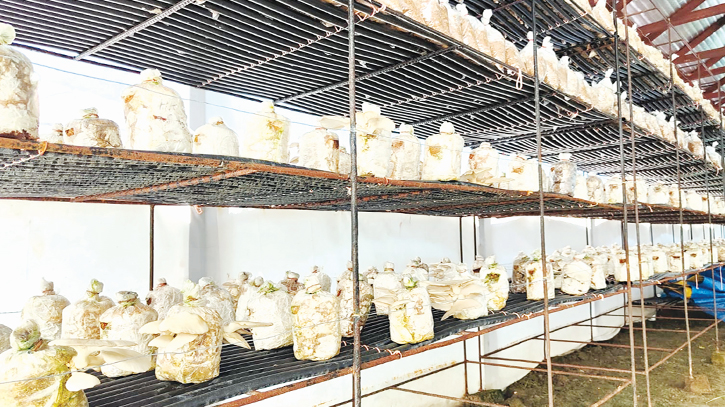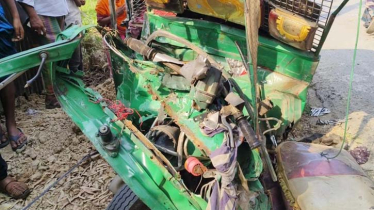
This recent photo depicts a mushroom farm in Feni. Photo: Messenger
Mushroom farming, often regarded as non-green fungal plant cultivation, is rapidly gaining traction in the agricultural landscape of the Feni district.
With growing demand in both domestic markets and export avenues, mushrooms present a promising opportunity amidst the challenges posed by traditional farming practices and evolving climate conditions. The cultivation of mushrooms not only offers avenues for growth and diversification but also provides access to lucrative markets.
In the heart of Feni Sadar Upazila lies K Pahalia Agro Park, situated at the foot of the Kalidas Pahalia River in the Kalidah Union, which stands as a beacon of potential for mushroom cultivation, drawing attention and interest from agricultural enthusiasts and entrepreneurs alike. Spread over 16 acres of once-fallow land, the park has been transformed into a multi-faceted agricultural venture, spearheaded by the vision of local stakeholders and public representatives.
With each kilogram fetching Tk 350, the economic viability of mushroom cultivation is underscored by its substantial demand, both locally and internationally. In Spain, where 20,000 mushrooms are being cultivated, the potential for mushroom Mushrooms, renowned for their taste, nutritional value, and medicinal properties, have emerged as a focal point within the diverse offerings of K Pahalia Agro Park. With each kilogram fetching Tk 350, the economic viability of mushroom cultivation is underscored by its substantial demand, both locally and internationally. In Spain, where 20,000 mushrooms are being cultivated, the potential for mushroom farming is evident on a global scale.
Feni Mushroom founder and Fazilpur UP chairman, Mojibul Haque Ripon, envisions K Pahalia Agro Park as a testament to Bangladesh's commitment to agricultural development. Under the leadership of Prime Minister Sheikh Hasina, initiatives like the Agro Park signify a dedication to maximizing land utility and fostering self-sufficiency in food production. Mushroom cultivation, alongside a myriad of other crops, symbolizes a step towards realizing this vision.
Assistant Agriculture Officer Md. Abu Tayyab echoes this sentiment, emphasizing the importance of utilizing fallow land for agricultural purposes. The establishment of K Pahalia Agro Park not only creates employment opportunities but also serves as a hub for knowledge exchange and innovation in farming practices. As Bangladesh strives towards agricultural excellence, such initiatives play a pivotal role in driving growth and sustainability.
Abdullah Hill Maruf, the manager of K Pahalia Agro Park, reminisces about the transformation of the once forested area into a thriving agricultural hub. With a diverse range of fruits, vegetables, and mushrooms being cultivated using natural methods, the park epitomizes eco-friendly and sustainable agriculture. The emphasis on pesticide-free produce underscores the commitment to delivering safe and healthy food options to consumers.
Looking ahead, K Pahalia Agro Park holds immense promise for Bangladesh's agricultural sector. As it continues to expand and innovate, the park is poised to become a model for sustainable farming practices. With a focus on toxic-free produce and economic empowerment, it stands as a beacon of hope for a greener, healthier, and more prosperous future for Bangladesh and its people.
The Mushroom Development Institute has introduced 162 varieties of edible mushrooms from various regions worldwide and has successfully adapted technologies for their cultivation within the country.
The increasing demand for mushroom products is attributed to their numerous health benefits. Despite the limited facilities, locally produced mushrooms maintain high quality, particularly during the winter season. To further expand this sector, both public and private support are essential, given the substantial demand in both domestic and global markets, offering opportunities for significant exports.
Messenger/Faria








